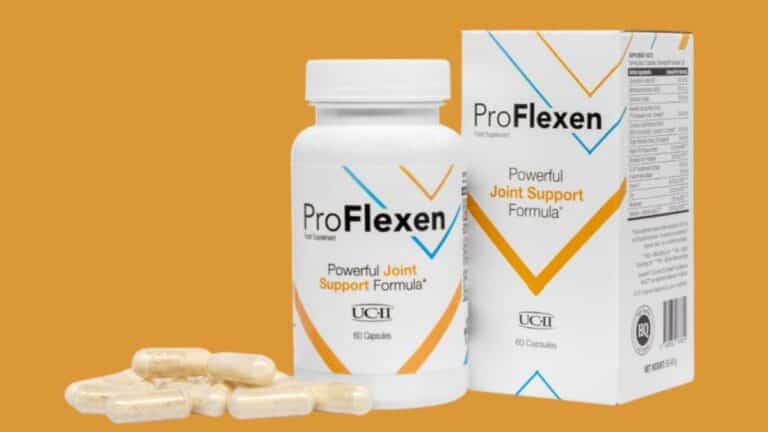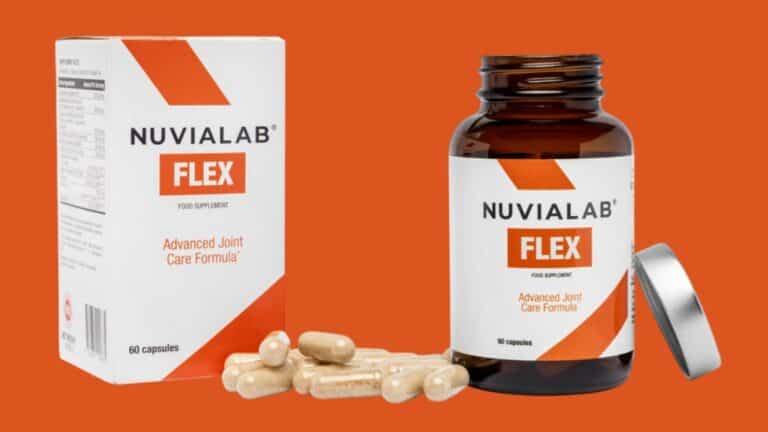In a world where movement is essential to everyday life, maintaining strong and flexible joints is key to staying active and pain-free. Whether you’re an athlete, a fitness enthusiast, or simply someone who values long-term mobility, finding the right joint support is crucial. However, if you have gluten sensitivities or follow a gluten-free lifestyle, choosing the right supplement can be a challenge. The good news is that there are high-quality joint health supplements gluten free that provide the support your body needs without the worry of hidden ingredients.
With the right blend of nutrients like glucosamine, chondroitin, and turmeric, these supplements help reduce inflammation, support cartilage repair, and improve joint flexibility. They allow you to keep doing the activities you love—whether it’s running, lifting, or just keeping up with daily life—without discomfort slowing you down. But not all supplements are created equal, and it’s important to know what to look for in a product to ensure it’s both effective and free from gluten and other unnecessary additives.
Gluten-Free Joint Health Supplements
When you’re looking to boost your joint comfort, diving into a world of supplements can be overwhelming. But if gluten’s your kryptonite due to sensitivities or Celiac disease, picking out gluten-free options is your superhero move.
Understanding Gluten-Free Labeling
Tackling joint health supplements? Well, deciphering gluten-free labels is your first pit stop. The Food & Drug Administration (FDA) says a supplement can be stamped gluten-free if it has less than 20 parts per million (ppm) of gluten (National Celiac Association). Since August 2014, these numbers have been the rule of the land. But plot twist—not all manufacturers must test their stuff or stick to a specific method (gfJules).
| Label | Gluten Content Standard |
|---|---|
| Gluten-Free (FDA) | < 20 ppm |
| National Celiac Association Certified | < 5 ppm |
Here’s the kicker: Makers can still call their goods gluten-free even if they roll off the line using machines that buddy-up with gluten. This head-scratcher means two same-looking bottles can both promise they’re gluten-free, yet one might have flirted with wheat on the side (gfJules). So, to really play it safe, scout for supplements with badges from rock-solid independent certifiers who aren’t afraid to test and audit like a hawk.
Importance of Gluten-Free Supplements
Let’s break it down. Popping supplements with gluten, when intolerant, is like inviting an unshakable house guest—you’ll end up with dodgy joints and extra drama. By going gluten-free with your joint health supplements, you sidestep the potential aches and woes.
- Punch Out Joint Pain: Got Celiac or just can’t handle gluten? It can spark joint drama and swelling. Gluten-free picks ease that chaos.
- Boost Your Whole Game: Gluten-free means you dodge extra health potholes—smooth sailing with no gluten highway hazards.
- Full Throttle Absorption: No gluten, no roadblocks. Your key ingredients get into buzz mode quicker and better, delivering all the promised benefits of your joint health supplements.
Want more deets on snagging the ultimate supplements? Head over to our article on the best joint health supplements.
Locking down supplements that shout ‘gluten-free’ and flaunt trusted, independent stickers makes your joint care a safe zone. Check our deep dives into natural joint health supplements, effective joint health supplements, and joint health supplements for arthritis so you can make the smartest choices for your body’s sidekick—your joints.
Joint Health Supplement Ingredients
Keeping those joints feeling jaunty isn’t just luck; it’s about what you put in your body! Let’s gab about three powerful players in keeping your bones cruising smooth: glucosamine, chondroitin sulfate, and hyaluronic acid.
Glucosamine: Cartilage Building
Glucosamine, imagine it as the construction crew for your cartilage – yep, that’s the cushiony stuff for your joints. A bunch of supplements out there swear by it, boldly asserting it helps keep your cartilage in tip-top shape, especially if you’re crackling with osteoarthritis. Studies on whether it’s truly the bee’s knees are hit or miss—with some folks singing praises about knee pain relief, while others say it’s just blowing smoke. (Healthline)
Glucosamine Benefits and Considerations:
- Gives your cartilage a boost and fixes it up when needed
- Could ease pain and get your joints moving better
- Mixed bag of research, so stay optimistic but cautious
Check those bottle labels for what kind you’re getting—glucosamine sulfate or hydrochloride—and make sure it’s gluten-free if that’s your jam. (best joint health supplements)
Chondroitin Sulfate: Proteoglycan Support
Chondroitin sulfate works like a personal trainer for your cartilage, keeping it stretchy by helping it hold onto water. Often teamed up with glucosamine, it’s the dynamic duo against osteoarthritis symptoms. A peek back at a few years’ worth of research in 2018 showed it can turn down the volume on joint pain—but whether mixing it with glucosamine makes a bigger splash is anybody’s guess (Healthline).
Chondroitin Benefits and Considerations:
- Turns down joint pain and stiffness
- Could cut down inflammation, great news for OA sufferers
- Best buddies with glucosamine for max effect
If gluten isn’t your friend, make sure your chondroitin is keeping its distance from it too. (joint health supplements for knees)
Hyaluronic Acid: Joint Lubrication
Hyaluronic acid—it’s your joints’ own slippery secret weapon! Essential for that smooth slide-and-glide action, it makes sure your joints aren’t squeaking like old floorboards. Plus, it’s good for keeping your cartilage elastic and ready for action. Hyaluronic acid’s your go-to for upping joint limberness and kissing joint pain goodbye (Dr. John R. Moore).
Hyaluronic Acid Benefits and Considerations:
- Keeps joints well-oiled and mobile
- Helps cartilage stay healthy and bouncy
- Can ease up joint stiffness and general achiness
And you guessed it—seek out those gluten-free labels for less hassle on your tummy. (joint health supplements for flexibility)
Comparative Table
| Ingredient | Key Perks | Research Rundown | Gluten-Free Tag? |
|---|---|---|---|
| Glucosamine | Boosts cartilage, cuts pain, supports joint hustle | Research seesaws; some thumbs-up for knee osteoarthritis | Double-check those labels |
| Chondroitin Sulfate | Knocks back pain, stiffness, swelling | Does well solo or with glucosamine, combo benefits still fuzzy | Peek at your packaging |
| Hyaluronic Acid | Smooths joint operations, jazzes up movement, chills discomfort | Proven for slicking up joints and adding some spring in the step | A gluten-free goody |
By mixing these ingredients into your daily groove, you’re on track to keeping your joints happy. Going gluten-free as needed amplifies the benefits so you can keep living your best life. For further scoop on joint health supplements, check out our sections on top joint health supplements and joint health supplements non-gmo.
Turmeric and Fish Oil Benefits
If you want to keep your joints feeling young and spry, supplements are your best pals. Meet turmeric and fish oil, two rockstars in the joint world that everyone seems to rave about, especially if you’re on the lookout for gluten-free goodies.
Turmeric for Pain Relief
Turmeric isn’t just the spice jazzing up your curry; it’s also doing wonders for those creaky joints. Its secret sauce is curcumin, the MVP for easing pain. A 2021 review of 10 studies gives curcumin a big thumbs up for helping knee osteoarthritis sufferers.
When you’re hunting for the right turmeric supplement, aim for ones loaded with curcumin. It’s a champ at tackling arthritis and other pesky joint issues by squashing inflammation and wiping away pain.
Traits of Top-notch Turmeric Supplements:
- Loads of curcumin
- No gluten, for the win!
- Bioperine for absorption power-up
For some killer picks, check out our stash of natural joint health supplements and organic joint health supplements.
Fish Oil for Osteoarthritis
Fish oil is like magic juice for joints. Packed with omega-3 fatty acids, it’s the secret weapon against inflammation, making it a go-to for osteoarthritis relief. A 2020 study shows fish oil taking down osteoarthritis pain and generally lifting spirits.
Here’s a quick hit from the National Institutes of Health on omega-3: dudes need 1,600 mg a day, and ladies, 1,100 mg. Fish oil’s easy to snag and no hassle to work into your daily grind.
| Omega-3 Dose* | |
|---|---|
| Men | 1,600 mg |
| Women | 1,100 mg |
*Source: Healthline
What Fish Oil Brings to the Table:
- Zaps joint inflammation
- Takes a hit at osteoarthritis pain
- Gets those joints moving smooth
Thinking about teaming fish oil up with some hard-hitting nutrients for total joint backup? Jump over to our picks for athlete-focused joint supplements and arthritis-targeted joint supplements.
For the lowdown on picking the right stuff, check our take on top joint health supplements. And if you’re picky about what goes in your body, make sure they’re gluten-free and non-GMO.
Additional Joint Health Ingredients
When you’re on the hunt for joint health supplements, there are a few magic elements that can really brighten up the life of your joints. They’re especially useful for those of us who need to avoid gluten, all while keeping our joints in tip-top shape.
MSM for Joint Pain Relief
Say hello to Methylsulfonylmethane, or MSM if that’s too much of a mouthful. It’s a natural whiz at kicking inflammation to the curb and is a lifesaver for folks dealing with creaky, painful joints, like those with osteoarthritis. In a recent 2023 study, folks who got a dose of MSM between 1,500 mg to 2,600 mg felt way better.
| Ingredient | Recommended Dosage | Benefits |
|---|---|---|
| MSM | 1,500 mg – 2,600 mg | Fights inflammation, eases pain, boosts joint performance |
MSM doesn’t just slow down inflammation—it might also lend a hand in fixing up cartilage. Make sure to look for MSM supplements that proudly wave the gluten-free flag. If you’re curious for more about joint health wonders, check out our guide on effective joint health supplements with MSM.
Vitamin and Mineral Supplements
Vitamins and minerals are like the fairy godmothers of any diet, working behind the scenes for joint happiness. But if you’re dodging gluten, pay extra attention: some supplements are sneaky and can hide gluten in their inactive ingredients. Here’s a roster of the MVPs for joint well-being:
- Vitamin D: Your bones’ best friend, making sure calcium gets invited to the party.
- Calcium: The ultimate supporter for strong bones.
- Vitamin C: Think of it as the craftsman of collagen—essential for that cushy joint cartilage.
- Magnesium: Loves helping out with muscle and nerve shenanigans.
Keep an eye out for gluten-free labels on these supplements—it’s your shield against unwanted reactions. Look for those stamps and certifications that yell “gluten-free” and other allergy-free claims.
| Vitamin/Mineral | Benefits | Typical Sources |
|---|---|---|
| Vitamin D | Bone cheerleader | Sun, supplements |
| Calcium | Bone builder | Dairy, supplements |
| Vitamin C | Collagen craftsman | Citrus fruits, supplements |
| Magnesium | Muscle mover | Leafy greens, supplements |
For even more tasty tidbits and recommendations, our piece on vitamin and mineral supplements is just what you need.
Adding these goodies to your routine not only treats your joints like royalty but also keeps you clear of gluten woes. Whether you’re aiming to say bye-bye to pain or just want to up your joint game, these ingredients are like little gifts for your journey to healthier joints. And for even more picks, don’t miss our top joint health supplements that cater to everyone, from spry sports enthusiasts to silver-haired champs.
Celiac Disease and Joint Health
Impact of Gluten on Joint Health
If you’ve got celiac disease or gluten sensitivity, gluten’s not just messing with your gut; it might be messing with your joints too. Munching on gluten could set off an inflammatory reaction that makes your joints hurt. That’s why sticking to a gluten-free lifestyle—ditching wheat, rye, barley, and those sneaky processed foods—is pretty much a must to keep everything in line Johns Hopkins Medicine.
Here’s a curveball: gluten sometimes sneaks into your supplements as fillers. Yeah, not cool. So, double-check those labels on joint health supplements to dodge any gluten-related surprises (National Celiac Association). Keeping an eye on the gluten-free certification can save you from unwanted flare-ups (gfJules).
Gluten-Free Diet for Arthritis
Cutting out gluten could spell relief if your joints are giving you grief, especially if you’ve got celiac disease or gluten sensitivity. The Arthritis Foundation gives a nod to gluten-free diets for easing up on rheumatoid arthritis pain and inflammation (Arthritis Foundation).
Going gluten-free takes a bit of effort—kind of like always being on the lookout. You gotta avoid gluten in anything you eat, maybe even in meds. Staying sharp on what you eat and getting the right supplements makes a world of difference for your joints (Johns Hopkins Medicine).
Check out our lineup of natural joint health supplements and joint health supplements for arthritis that’s made for folks like you, keeping it gluten-free while boosting that joint mojo.
| Organization | Focus Area |
|---|---|
| The Gluten-Free Certification Organization | Gluten Shield |
| The National Celiac Association | Gluten-Free Standards & Audits |
| Kitchens with Confidence by MenuTrinfo | Gluten Testing & Certification |
Wanna know more ways to keep those joints happy? Peek at our articles about top joint health supplements and joint health supplements for runners.
Enjoy the good vibes of a gluten-free diet with fitting supplements and smart food picks. It’s your ticket to easing symptoms and smiling through the day with happier joints.
Research on Gluten-Free Diets
Wondering how dodging gluten could help keep your joints in check? There’s a lot to chat about, particularly when it comes to what folks and experts think on this wobbly topic.
Controversy on Non-Celiac Gluten Sensitivity
Non-celiac gluten sensitivity (NCGS) is a bit of a hot potato in the health scene. A bunch of folks say they feel crummy much like they’ve got celiac disease after eating gluten, even when the tests say they’re clear. This has a lot of people scratching their heads over how real NCGS is.
Lots of folks have stories, but there’s not a ton of solid science backing them up. A Cochrane review in 2010 found it’s still up in the air if gluten-free munching really helps with pain and stiffness in people with rheumatoid arthritis (RA). They need more good data to say for sure if gluten messes with non-celiac folks’ joints.
Studies on Rheumatoid Arthritis and Gluten
Rheumatoid Arthritis (RA) is that annoying hitch where your immune system throws a fit, making your joints ache and swell. The whole gluten connection is still a bit fuzzy. Some studies hint that ditching gluten might ease symptoms for people with RA, but the details aren’t crystal clear.
Back in 1991, a study split RA folks into two squads: one going gluten-free, the other just doing their thing. The gluten-free bunch felt better overall, but when it came to joint damage seen on X-rays, it was a draw (National Center for Biotechnology Information).
The Impact of Gluten-Free Diets on RA Symptoms
Amidst all the chat, some research hints that cutting gluten might help certain RA peeps, but the proof isn’t strong enough to say everyone with RA should jump on the gluten-free bandwagon. Plus, the Arthritis Foundation points out that if you’ve got one autoimmune bugbear, adding another, like gluten issues, might not be far behind. So, a gluten-free diet might be a go if you’ve got celiac disease or gluten sensitivity specifically.
Here’s a quick glance at how RA folks fare when they mess with their diet:
| Study Variable | Control Group | Gluten-Free Group |
|---|---|---|
| Pain Reduction | Low | Moderate |
| Stiffness Improvement | Low | Moderate |
| Mobility Enhancement | Low | Moderate |
| Radiographic Deterioration | None | None |
While everyone’s on the lookout for gluten-free joint health goodies, the takeaway is to get some tailored advice. Always check with your doc before you swap your diet or pop new supplements for joint relief.
Get more scoop by checking out our fuller guides on top joint health supplements, natural joint helpers, and stuff for runner’s joints.
Final Thoughts
Prioritizing joint health is one of the best investments you can make for your long-term mobility and overall well-being. With so many options on the market, choosing joint health supplements gluten free ensures you’re getting the support your body needs while avoiding potential allergens or digestive issues. Whether you’re recovering from an injury, managing arthritis, or simply looking to prevent joint problems, the right supplement can make a world of difference.
By carefully selecting a gluten-free joint supplement with high-quality ingredients, you can feel confident in your daily movement and reduce the risk of joint pain as you age. Remember, the key to strong, healthy joints isn’t just about what you avoid—it’s about choosing the right nutrients to support your body’s natural ability to repair and stay flexible. Take care of your joints today, and they’ll take care of you for years to come.
Frequently Asked Questions
What are the best joint health supplements gluten free?
The best gluten-free joint supplements contain ingredients like glucosamine, chondroitin, MSM, turmeric, and collagen to support joint flexibility, reduce inflammation, and promote cartilage repair. Look for brands that explicitly state they are gluten-free and third-party tested for quality.
Why should I choose a gluten-free joint supplement?
If you have celiac disease, gluten sensitivity, or prefer to avoid gluten for dietary reasons, a gluten-free joint supplement ensures you’re not exposing yourself to potential allergens or digestive discomfort. It also eliminates unnecessary fillers that some brands use.
Are all joint supplements naturally gluten-free?
Not necessarily. Some supplements contain additives, fillers, or binding agents that may include gluten. Always check the ingredient label and look for certifications that confirm the product is gluten-free.
How long does it take for joint health supplements to work?
Results vary depending on the individual and the supplement, but most people notice improvements in joint comfort and mobility within a few weeks to a few months of consistent use.
Can I take joint health supplements gluten free with other medications?
While many joint supplements are safe, it’s always best to consult with a healthcare provider before adding them to your routine, especially if you’re taking blood thinners or medications that affect inflammation.
Do gluten-free joint supplements have side effects?
Most people tolerate them well, but some may experience mild digestive upset or allergic reactions to certain ingredients. Always check the label for potential allergens and start with a small dose if you’re unsure how your body will react.







